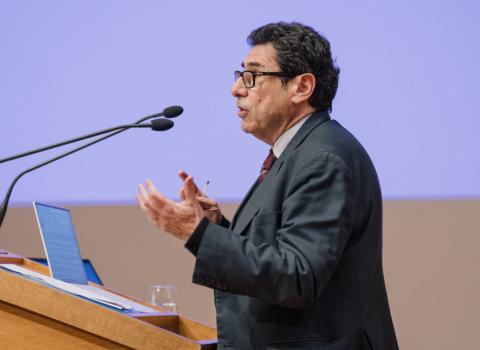Philippe Aghion backs the European Research Council’s bid to become independent, saying its autonomy is at risk

French economist Philippe Aghion, one of the winners of this year’s Nobel Prize for economics. Photo credits: Bea Uhart, Vodafone Institute / Flickr
French economist Philippe Aghion, one of the winners of this year’s Nobel Prize for economics, has called on the European Commission to strengthen the independence of the European Research Council (ERC).
Speaking at the European Business Summit on November 19, he called on policymakers to “secure the long-term stability of the ERC by establishing it as a permanent, standalone, independent body, within the European Union, similar to the European Central Bank.”
This is needed in part because of Commission plans to harmonise rules across the Horizon Europe research programme. “I believe, personally, there is a danger that ERC autonomy will be eroded,” he said.
Aghion’s call echoes a letter sent by the ERC’s Scientific Council to the Commission in June, before the latter published its proposal for the post-2027 Horizon Europe programme. In it, the Scientific Council requested a permanent, standalone structure with its own legal basis in a regulation.
That request was not addressed in the Commission’s proposal. Instead, there are plans to reduce the length of the ERC president’s mandate and introduce a single rulebook for all research and innovation funding instruments. However, ERC president Maria Leptin recently told Science|Business she had received assurances the ERC would not be constrained by this single set of rules.
The ERC, which supports investigator-driven frontier research, already has a significant degree of independence to draw up work programmes and determine the types of grants and budgets available to applicants, free from top-down policy priorities.
“The ERC is great, because before, we had bureaucrats deciding how to allocate research funding,” said Aghion, who has benefited from two ERC Advanced Grants during his career.
Mid-tech trap
Aghion is a professor at Collège de France, Insead business school and the London School of Economics. He also contributed to Mario Draghi’s landmark report on European competitiveness, which has had a strong influence on the Commission’s proposal for the post-2027 EU budget instruments. That report warned that a significant share of private R&D funding in the EU goes towards the “middle technologies” of the previous century such as automotive, whereas most US investment goes to high-tech sectors, creating a significant innovation gap.
“If we want to move in Europe from mid-tech, incremental innovation to high-tech, breakthrough innovation, more than ever we need an ERC that is not only secured, but enlarged,” Aghion said. “There won’t be breakthrough innovation done in Europe if ERC autonomy is not secured.”
He also wants to see the ERC empowered to fund not only individual projects, but also research labs. This suggestion is based on the French “laboratoires d'excellence” initiative, launched in 2010, which provided ten-year funding for research units.
The ERC is the “natural vector” for rolling out this concept at EU level, he said. He argued that long-term funding for research labs would encourage risk taking.
Aghion questioned whether all EU countries had heeded Draghi’s warning about the urgency of Europe’s decline compared to the US and China. “When you have Covid, you act; when you have Putin, you act. I don’t think there is this sense of urgency that the European decline is a problem,” he said.
Strengthening the ERC is one of the few things that can be done at EU level. For other measures recommended in the Draghi report, a smaller group of countries should take the lead in a “coalition of the willing” approach, Aghion said.
Budget fight
In budget terms, the ERC is one of the winners of the Commission’s proposal for the next Horizon Europe programme, almost doubling its resources from €16 billion to €31.5 billion.
However, the research community should not get carried away, according to Pascal Lamy, who chaired the high-level group that advised the Commission on the current Horizon Europe. Speaking on the same panel, he called the almost doubling of the overall Horizon Europe budget “the sacrificial lamb” that member states are likely to cut as a way to reduce the overall EU budget while preserving politically sensitive pots such as agriculture.
“The odds [the doubling] will happen are very low,” he said. “If we get a plus to the existing roughly €100 billion which we have for the programme, that would be great, unless we organise a fight.”
Related articles
- Establish an ‘ERC for labs’, says economics Nobel Prize winner
- Leptin re-appointed at the helm of ERC as FP10 talks begin
- Single rulebook for EU research funding risks ‘death’ by inflexibility, warns ERC president
Europe’s industry also recognises the importance of early-stage research. “I think our plea from industry is to say we need good support, good funds for fundamental research, of which we do not know today what the applications will be,” said Jean-François van Boxmeer, chair of the European Round Table for Industry, at the conference.
The priorities should be financing the next frontier of innovation, and helping to scale up those technologies in Europe once the frontier has been discovered, he said.





 A unique international forum for public research organisations and companies to connect their external engagement with strategic interests around their R&D system.
A unique international forum for public research organisations and companies to connect their external engagement with strategic interests around their R&D system.